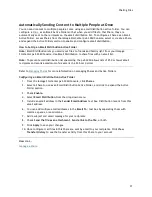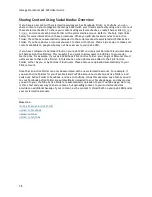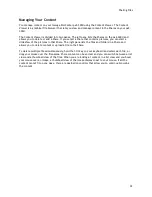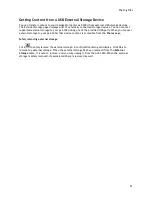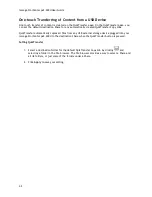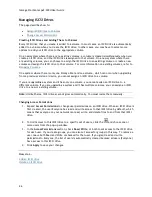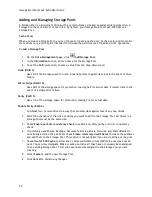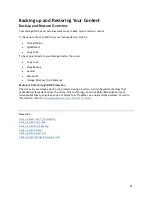
Storage Pool Management
51
Managing Drives
The Drive Management page provides settings for managing storage and lets you apply global settings
The Drive Management page provides settings for managing storage and lets you apply global settings
for drives on your Iomega StorCenter px2-300d .
Setting Write Caching
Select a value for disk write caching.
Write caching is a mechanism that attempts to separate the fast processing speed of the px2-300d
from the relatively slow mechanics of actually writing data to drive.
With write caching disabled, every write to drive causes the px2-300d to wait while the data is
written to drive, which can slow performance. When write caching is enabled and the px2-300d
sends a write request to the drive, it writes the data to cache (which is much faster) and sends an
immediate acknowledgement to the px2-300d saying the write is complete. The system proceeds
without waiting for the data to actually get written to drive, which occurs in the background.
While write caching does improve performance, there are some risks. The system responds that the
data is written to drive when in fact it has only been written to cache. Should the px2-300d lose
power, any data not completely written to drive is lost forever.
This is because cache memory is volatile. If you lose power, the contents of the cache are lost.
Therefore, if there were any pending writes in the cache that were not written to the drive, they
will be lost forever. Using a UPS (Uninterrupted Power Supply) can mitigate the risk associated with
write caching, which is why it is recommended to only enable this feature when a UPS is connected.
Applying Global Drive Management Settings
Setting Write Caching
Select a value for disk write caching.
Write caching is a mechanism that attempts to separate the fast processing speed of the px2-300d
from the relatively slow mechanics of actually writing data to drive.
With write caching disabled, every write to drive causes the px2-300d to wait while the data is
written to drive, which can slow performance. When write caching is enabled and the px2-300d
sends a write request to the drive, it writes the data to cache (which is much faster) and sends an
immediate acknowledgement to the px2-300d saying the write is complete. The system proceeds
without waiting for the data to actually get written to drive, which occurs in the background.
While write caching does improve performance, there are some risks. The system responds that the
data is written to drive when in fact it has only been written to cache. Should the px2-300d lose
power, any data not completely written to drive is lost forever.
This is because cache memory is volatile. If you lose power, the contents of the cache are lost.
Therefore, if there were any pending writes in the cache that were not written to the drive, they
will be lost forever. Using a UPS (Uninterrupted Power Supply) can mitigate the risk associated with
write caching, which is why it is recommended to only enable this feature when a UPS is connected.
Applying Global Drive Management Settings
1.
Click
Settings
.
Summary of Contents for StorCenter px2-300d
Page 1: ...Iomega StorCenter px2 300d User Guide D31621200 ...
Page 2: ......
Page 12: ......
Page 60: ......
Page 65: ...Storage Pool Management 53 learn more about how content is stored ...
Page 72: ......
Page 76: ......
Page 116: ...Iomega StorCenter px2 300d User Guide 104 How do I create an Iomega Personal Cloud ...
Page 126: ......
Page 132: ......
Page 154: ......
Page 160: ......

